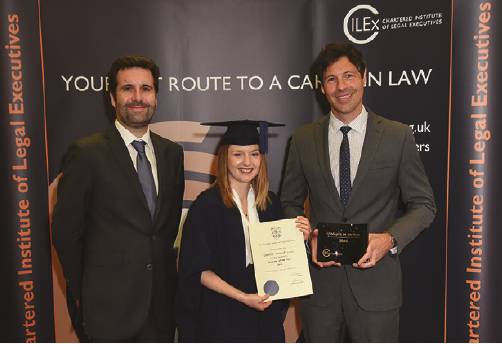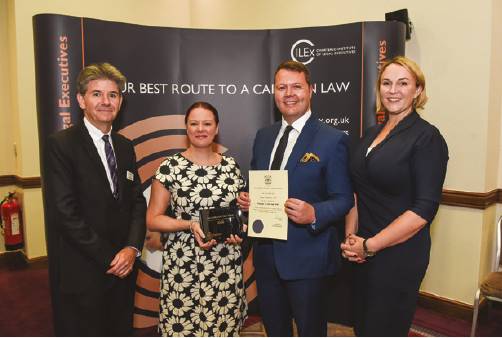CILEx Awards recognise the cream of the crop

CILEx has honoured excellence in study, practice and practical training with five prestigious awards, which were presented at the CILEx graduation and admissions ceremonies in October. This year’s award winners were as follows:
- Graduate of the Year (sponsored by Hoopers International Probate Genealogists): Gemma Ashcroft (pictured).
- Employer of the Year (sponsored by CILEx Law School (CLS)) : Bond Dickinson (pictured).
- Pro Bono Award (sponsored by Kings Court Trust): Christine Howard.
- CILEx President’s Award (sponsored by CILEx): Muhammed Abdul Muid Khan.
- CILEx Apprentice of the Year (sponsored by CLS): Jessica Parlour.
Graduate of the Year Gemma Ashcroft works as a legal officer in the adult social care and education legal team at Wigan Council, and studied part-time at the Law Academy in Liverpool. On receiving the award, Gemma said: ‘I am incredibly honoured to be awarded CILEx Graduate of the Year. I have worked very hard, and I feel very privileged and humbled that my efforts have been recognised. I would like to thank my family and friends, my colleagues at Wigan Council and the Law Academy for all their support throughout my studies.’ Employer of the Year Award Bond Dickinson is a national law firm that recruited three legal apprentices in 2014, a further three in 2015 plus a Business Administration apprentice. The firm has also recently enrolled a third cohort of three legal apprentices in its Plymouth office.
On accepting the award, Mark Norman-Ball, the firm’s onshore deputy manager, said: ‘We are delighted that our apprenticeship programme has been recognised in this way. Legal apprenticeships are now playing an important role in our pipeline of future fee earners. To date, two of the apprentices from our first cohort have been promoted into paralegal roles during August 2016, ahead of plan.’

Jenny Pelling, CLS’s director of business and apprenticeships, said: ‘We congratulate Bond Dickinson on the award, which is in recognition of the strong support structure they have in place and the progression opportunities for their apprentices and CILEx students.’
- For details about the other 2016 CILEx Award winners, see page 10 of this issue.
Lord Chancellor comments on diversity in the legal profession
Speaking at the Conservative party conference in Birmingham in October, Elizabeth Truss, the Lord Chancellor and Secretary of State for Justice, said that there is not enough diversity in the legal system.
CILEx chief operating officer, Linda Ford said: ‘Liz Truss is right to say the ‘legal profession should be leading the field’ on diversity and social mobility. Just a few days ago, I was enormously proud to see that in practice as I joined the celebrations of CILEx’s record number of graduates, who qualified through vocational and apprenticeship-style learning routes, many from disadvantaged backgrounds, black and minority ethnic communities, and a significant majority of whom were women.
‘While CILEx offers a genuinely accessible and affordable pathway to be a lawyer, progression and advancement is not always based on merit. CILEx lawyers still encounter barriers to fulfilling their full potential, including the ability to seek senior judicial appointments. We want to work with the Lord Chancellor and her team to remove the barriers that hold Chartered Legal Executives back, and create a culture in the legal sector where your only limit is your ambition.’
News in brief
New chief executive for HMCTS
Susan Acland-Hood has been appointed to the post of chief executive of HM Courts and Tribunals Service. Susan Acland-Hood, who is currently director of enterprise and growth at HM Treasury, will take up the position on 21 November 2016.
Research on CLEs’ ambitions
Research conducted for the Solicitors Regulation Authority (SRA) by Nottingham Law School, has found that Chartered Legal Executives are now 'less likely to want to become solicitors'. The research was carried out as part of the SRA's Training for Tomorrow project, and surveyed 804 law students, graduates, paralegals, trainee solicitors and Chartered Legal Executives online, followed up with 23 qualitative interviews.
Pre-qualification work experience in professional legal education, available at: http://tinyurl.com/jja8yx2
The court and tribunal estate in England and Wales
In respect of the national consultation on the provision of the court and tribunal estate, the potential implementation dates document has just been updated. These dates give an indication of when courts will cease to provide a public-facing service. This timetable is subject to change as the programme progresses.
- Available at: http://tinyurl.com/jnqpdd4
Opening of the Legal Year
Speaking at the ceremony on the opening of the legal year, Elizabeth Truss, Lord Chancellor and Secretary of State for Justice, said that she ‘was delighted’ to be working with a great generation of reforming senior judges, including the Lord Chief Justice, Lord Thomas, ‘with whom I recently published a joint plan for modernising the courts and tribunals’ (see page 24 of this issue).
She continued: ‘I am determined – as Lord Chancellor – to respect the rule of law here and abroad, to defend the independence of the judiciary, and to ensure the provision of resources for the support of the courts.’
CILEx President Martin Callan, who attended the event, has written about the ceremony (see page 38 of this issue).
Stamp duty in Wales to change
In 2018, Wales will introduce the first Welsh tax for 800 years. The Welsh Government will take responsibility for stamp duty land tax (SDLT), which is paid when somebody buys or leases a property or land over a certain price in Wales.
SDLT will be replaced by land transaction tax (LTT) and will affect a range of parties, such as homebuyers and businesses located in Wales. The bill to pass LTT into Welsh law will be examined over the coming months in the Assembly.
To inform scrutiny of this bill, and to better understand the views of the people of Wales, the National Assembly of Wales finance committee wants to hear as many views as possible from across Wales. The committee has launched an online discussion (see below for contact details). Participants will be able to pose their own questions and respond to those posted by others. This discussion will close on 21 November 2016.
Call for Wales to have own legal system
The case for a separate legal system for Wales has been outlined by Mick Antoniw, Counsel General for Wales. Speaking at the Legal Wales Conference in Bangor University in October, he said that the increasing volume of Welsh-only laws meant that the creation of a distinct legal jurisdiction for Wales was inevitable, and therefore it makes sense to start working on a separate system now.
‘Now that we have two legislatures, it goes without saying that we should have two jurisdictions. It concerns me greatly that, somehow, the concept of the England and Wales jurisdiction has taken on a sort of mythical and philosophical aura. I take the view that the creation of distinct jurisdiction is a modest and sensible transitional way forward until there is such a body of Welsh or English law that the move to separate jurisdictions becomes inevitable.’
Mick Antoniw told the conference that the Welsh Government had already set out a vision of what a distinct jurisdiction could look like, but in the meantime it had to make a single jurisdiction work. He said that the creation of a distinct legal jurisdiction would be an opportunity to develop a Welsh solution to counter a raft of UK government reforms which are reducing access to justice. The significant cuts in legal aid since 2013 are being compounded by a substantial programme of court closures across Wales and England and a series of increases in court fees and the imposition of new fees. This is resulting in rising numbers of people appearing in court without a lawyer to represent them, which is causing problems for the court and tribunal system and the judiciary.
‘Legal aid is not devolved, we do not have the funding to restore the cuts in legal aid, but we can start to look at doing things differently. We have to look how our tribunals operate, how we improve access to them; we have to look at the advice systems funded by the Welsh Government, pro bono systems, trade union legal support systems, and third sector support and advice organisations. There may be an opportunity here to be creative, draw different strands together and create an alternative model.’